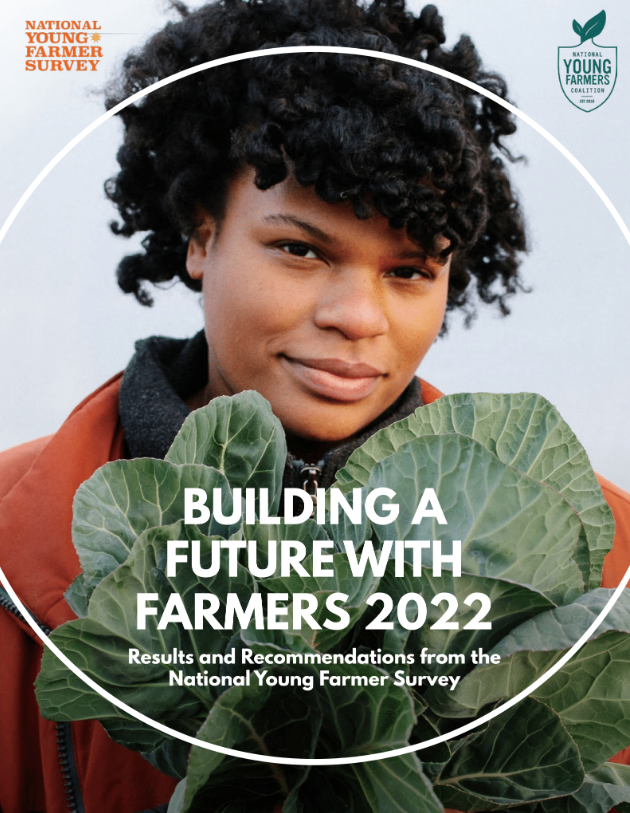Policy change is necessary for a radical future.

Young Farmer Policy Agenda
In 2022 and 2023, we are focused on shaping the next Farm Bill and USDA’s administrative priorities, to address the structural challenges facing this new generation of young and Black, Indigenous, People of Color (BIPOC) farmers. We are collaborating with farmer leaders, policy makers, and diverse stakeholders to envision and design a policy framework that prioritizes equitable land access and transition, and that is deeply informed by young farmer challenges and needs related to climate change, access to clean water, viability and economic justice, and immigration and labor.
There is incredible opportunity and power to be explored and directed in the 2023 Farm Bill.
This legislation—the government’s primary food and agriculture policy tool—is our last best chance to ensure equitable land access, racial equity, climate justice, farmer mental health, and USDA access and accountability are all truly addressed for the next generation of farmers and ranchers.
Learn more about our priorities here.
Young farmers deserve equitable land access.
Access to land is the number one challenge facing the next generation of farmers in the United States, and centuries of discrimination and dispossession have put this resource out of reach of farmers who are Black, Indigenous, and People of Color (BIPOC) in particular.
With millions of acres on the verge of changing hands and leaving agriculture forever, the 2023 Farm Bill—the primary food and agriculture policy tool of the U.S. government—is our last chance to ensure this land transitions equitably to the next generation.
Learn more here.
The damaging effects of climate change on agriculture are escalating, and the time to act is now.
We are working for comprehensive climate legislation and administrative action that provides resources to the young farmers and farmers of color who are and will combat climate change and build resiliency on their farms across the country. We do this through farmer-led policy reform, climate advocacy and education, and collaborative and transformative partnerships with peer organizations and allies.
Learn more here.
Learn more here.
We are farmers in solidarity with farm workers.
The future of agriculture in this country is interconnected to immigration and labor issues. Immigrant farm workers and other food systems workers provide essential services while bearing the weight of a system that exploits their labor with little compensation. Supporting the transition of immigrants, farm workers, and food systems workers to farm ownership and other agricultural roles will keep agricultural production stable and revitalized as a large population of farmers retire and transition their farms. We must act as an ally and advocate for immigrants rights and better labor conditions in agriculture and in the food system.
Learn more here.
Federal programs are failing to reach the next generation of farmers and ranchers.
The United States Department of Agriculture (USDA) is tasked with ensuring the success of our nation’s farmers and ranchers, but for decades its programs and policies have been designed to support a select few: larger and larger operations, primarily growing commodities (for export). In addition to exclusive program design, documented discrimination at USDA has contributed to the significant decline in Black farmers.
Seventy-one percent of respondents in our 2022 Young Farmers Report reported being unfamiliar with USDA programs, and 26% had applied but were denied.
Learn more here.
Cultivemos (formerly known as FRSAN-NE, the Farm and Ranch Stress Assistance Network Northeast) aims to improve behavioral health awareness, literacy, access, and outcomes for farmers, ranchers, and farmworkers in the Northeast by developing a service provider network that can assist and meet the unique needs of agricultural workers.
Learn more here.
Policy Setting Process
Young Farmers has historically created federal policy platforms and campaigns by surveying young farmers nationally and gathering informal feedback from our members and chapters. In 2018, in order to more directly engage our farmer members, we began developing a process to ensure young farmers, especially BIPOC farmers, have a formal voice in setting our federal policy platform and that our platform reflects the on-the-ground needs of our farmer members.
A Better Farm BilL
Join the Young Farmers' Farm Bill Rapid Response Network
Racial Equity
We recognize racial equity not as a policy pillar, but as the base upon which all policy must stand.
Young Farmers centers racial equity in our programs, policy, and advocacy campaigns. We know that federal agricultural policies have reinforced the systemic racism that encumbers BIPOC farmers in almost every aspect of life, and we commit to advocating for anti-racist policy change. Programs that were created to directly address racial inequities must remain adequately funded, and all programs and policies must move towards centering racial equity in their programmatic design.
Campaigns News
- April 25, 2024
- Latest from Young Farmers
- April 23, 2024
- Latest from Young Farmers
- April 22, 2024
- Latest from Young Farmers
- April 17, 2024
- Latest from Young Farmers
- April 12, 2024
- Latest from Young Farmers
- April 11, 2024
- Land Access, Latest from Young Farmers